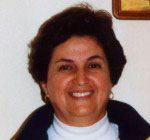From the Diary of Madame Mao
Just Following Orders
With its forelegs a mantis pins down its prey
there are circumstances
just following orders
a strip of rabbit fur
by the incense burner
releases the wood’s fragrance
how can I warm the hearth
when all the cranes fly over to the north
without stopping to drink water
If You Raise Crows
I am left
at the mercy of the mob
where are my guards
those handsome young men
with their fish eyes
they used to eat from my hand
now they deny knowing me
beyond the sharp blade
caressing my throat
the buzz of the swarm
My Daughter Nah’s Visit
There was a time when I loved deeper than I suffered
a time when from every man I desired a child
as a girl I’d hunt rabbits
roast them on a crude fire
then clean their bones and string necklaces
nothing’s left of that girl but a faint penchant
for setting traps
daughter help me
save me from a bullet to the head
why are you ashamed of me?
a widow is a bird with just one wing
when you come to say goodbye bring cellophane
to wrap my heart tender and throbbing
![]()
Sólo obedecía órdenes
Una mantis extiende sus patas y presiona la presa
hay atenuantes
sólo obedecía órdenes
junto al incensario
un resto de piel de conejo
hace a la madera despedir fragancia
cómo puedo calentar el hogar
si todas las grullas pasan hacia el norte
sin detenerse a beber agua
Cría cuervos
Me he quedado
a merced de la turba
dónde está mi guardia
esos hermosos jóvenes
con ojos de pez
comían mendrugos de mi mano
ahora me desconocen
detrás del filo cortante
que acaricia mi garganta
el zumbido del enjambre
La visita de mi hija Nah
Hubo un tiempo en que amé más allá del dolor
un tiempo en el cual de cada hombre deseaba un hijo
de niña cazaba conejos
los asaba en un fuego rustico
después limpiaba sus huesos y los hacía collares
de esa niña sólo queda un ligero impulso
por armar trampas
ayúdame hija
sálvame de una bala en la cabeza
¿por qué te avergüenzas de mí?
una viuda es un ave con un ala
cuando vengas a despedirte trae papel celofán
y envuelve mi corazón que aún palpita
Translator’s Note
We initially got to know Ogliastri’s work several years ago, when a mutual friend brought us a copy of her previous book, Polo Sur, a sequence of poems relating her father’s imaginary journey from the Amazon jungle to the South Pole. We fell in love with her distinctive poetic voice and translated the book (South Pole/Polo Sur, published by Settlement House, 2011). When she told us that her next book of poems would tell the story of the Mao era in China through the voice of his wife, Jiang Qing, we were immediately eager to translate it.
From the Diary of Madame Mao emerged from the author’s extensive research on the lives of both Jiang Qing and Mao, as well as Chinese history, culture, and literature. Thus, before we could embark on the translation, we had to become familiar with the subject matter. We believe that translating poetry requires the translator to “become” the author, as we are tasked with writing the poems in a new language. We have to be able to put ourselves into the poet’s mind, to visualize the same images. So we started out by reading a biography of Jiang Qing, as well as a historical novel (Becoming Madame Mao, by Anchee Min), recommended by Ogliastri.
Because of the multi-layered nature of the project—where the language is Spanish, but all the cultural references are Chinese—the translation process was also multi-layered. First, we applied the collaborative process that we had developed in translating Ogliastri’s previous book (South Pole), which involves “identifying the essential elements” of the author’s style so that we can maintain consistency in the voice of the translations, regardless of who is working on a particular poem. For Ogliastri, the key elements are concise language, using line/stanza breaks in lieu of punctuation, and a strong emphasis on imagery. In fact, with Ogliastri’s poetry, the image often takes precedence over the words, so that the process requires translating “image by image” rather than line by line. (A fuller description of our approach can be found in our essay “One Poet, Two Translators: Toward a Single Voice.”)
The second, added layer in the Madame Mao collection involved researching the historical, biographical, or cultural references to ensure that we were representing these accurately and using the appropriate English terminology. An example is the first line of “My Daughter Nah’s Visit,” which literally could be translated, “There was a time when I loved beyond pain/hurt.” But we knew from our reading that Jiang Qing’s childhood had been traumatic and involved a great deal of suffering: poverty, domestic violence, social humiliation, and then abandonment by her mother. Thus, we decided that Ogliastri’s dolor would be best be captured by “suffering” and that más allá in this case implied the depth of emotion and passion rather than distance, hence we chose “deeper” rather than the standard translation “beyond.”
We hope you find these poems as compelling as we do.
 Maria Teresa Ogliastri was born in Los Teques, Venezuela, and lives in Caracas. She is the author of five collections of poems: Del diario de la señora Mao (From the Diary of Madame Mao, 2011), Polo Sur (South Pole, 2008), Brotes de Alfalfa (Alfalfa Sprouts, 2007), Nosotros los inmortales (We, the Immortals, 1997) and Cola de Plata (Silver Tail, 1994). She has been featured at poetry festivals throughout Latin America, and her poems appear in several anthologies of contemporary Venezuelan poetry.
Maria Teresa Ogliastri was born in Los Teques, Venezuela, and lives in Caracas. She is the author of five collections of poems: Del diario de la señora Mao (From the Diary of Madame Mao, 2011), Polo Sur (South Pole, 2008), Brotes de Alfalfa (Alfalfa Sprouts, 2007), Nosotros los inmortales (We, the Immortals, 1997) and Cola de Plata (Silver Tail, 1994). She has been featured at poetry festivals throughout Latin America, and her poems appear in several anthologies of contemporary Venezuelan poetry.
 Yvette Neisser Moreno is the author of Grip (2011 Gival Press Poetry Award), co-translator of Ogliastri’s South Pole/Polo Sur (2011), and editor of Difficult Beauty: Selected Poems by Luis Alberto Ambroggio. She co-directs the DC-Area Literary Translators Network (DC-ALT), teaches at The Writer’s Center, and works as an international research analyst.
Yvette Neisser Moreno is the author of Grip (2011 Gival Press Poetry Award), co-translator of Ogliastri’s South Pole/Polo Sur (2011), and editor of Difficult Beauty: Selected Poems by Luis Alberto Ambroggio. She co-directs the DC-Area Literary Translators Network (DC-ALT), teaches at The Writer’s Center, and works as an international research analyst.





